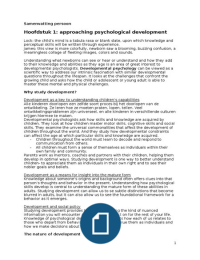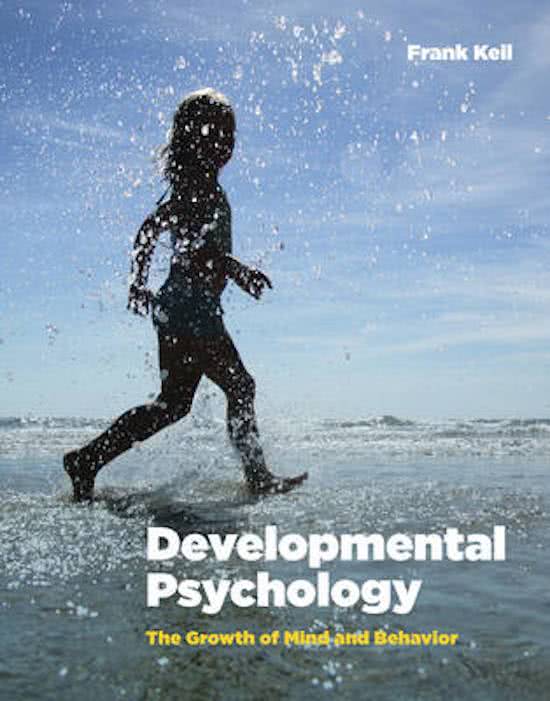Samenvatting persoon
Hoofdstuk 1: approaching psychological development
Lock: the child’s mind is a tabula rasa or blank slate, upon which knowledge and
perceptual skills will be written through experience.
James: this view is more colorfully, newborn saw a blooming, buzzing confusion, a
meaningless collage of fleeting images, colors and sounds.
Understanding what newborns can see or hear or understand and how they add
to their knowledge and abilities as they age is an area of great interest to
developmental psychologists. Developmental psychology can be viewed as a
scientific way to address our intrinsic fascination with similar developmental
questions throughout the lifespan. It looks at the challenges that confront the
growing child and asks how the child or adolescent or young adult is able to
master these mental and physical challenges.
Why study development?
Development as a key to understanding children’s capabilities
Alle kinderen doorlopen een zelfde soort proces bij het doorlopen van de
ontwikkeling. Ze leren hoe ze moeten praten, lopen, tellen. Veel
ontwikkelingsproblemen zijn universeel, en alle kinderen in verschillende culturen
krijgen hiermee te maken.
Developmental psychologists ask how skills and knowledge are acquired by
children. They look at how children master motor skills, cognitive skills and social
skills. They examine the universal commonalities that affect the development of
children throughout the world. And they study how developmental constraints
can affect the age at which particular skills and knowledge are acquired.
- Children throughout the world must learn to decode and respond to
communication from others.
- All children must form a sense of themselves as individuals within their
own family and community.
Parents work as mentors, coaches and partners with their children, helping them
develop in optimal ways. Studying development is one way to better understand
children- to appreciate them as individuals in their own right and to see their
nobler goals and beliefs.
Development as a means for insight into the mature form
Knowledge about someone’s origins and background often offers clues into that
person’s thoughts and behavior in the present. Understanding how psychological
skills develop is central to understanding the mature form of these abilities in
adults. Studying development can allow us to se subtle distinctions that become
blurred in adults, but it can also allow us to see the foundational framework for a
behavior as it emerges.
Development and social policy
Studying development provides tools for evaluating the kind of nuanced
information you will encounter and often have to act on for the rest of your life.
Knowledge of psychological development also affects how each of us relates to
those who depart from behavioral norms, how we value them as individuals and
how we make decisions about their welfare.
The nature of development
1
,Psychological development includes patterns of change in mind and behavior
that occur as an organism progresses through its lifespan. The mental changes
involve the growth of processes such as perception and reasoning, as well as
changes in emotion and motivation. Behavioral changes over the lifespan range
from young children’s toilet training or learning to avoid temper tantrums to
adolescents beginning to date.
Categorizing developmental phenomena
Development can be divided into periods and domains.
One way of categorizing developmental patterns involves dividing the lifespan
into a series of developmental periods based on age- most commonly these are:
- The prenatal period
Covers development form the moment of conception to birth some 9,5
months later. The study of early prenatal development focuses largely on
anatomical and physiological development.
- Infance
Refers usually to the first year to year and a half of life. The most notable
feature of this period is that infants are largely preverbal. Absence of
language, lack the ability to think about anything that is not present.
- The preschool period
From roughly age 1,5 to 4, includes changes on several fronts. Language
appears and flourishes suchthat most 4 year olds can chatter away on any
number of topics. They show the ability to think about things that are not
present, and their memory skills often improve considerably. Socially,
children improve in their ability to understand other people’s mind, and
they develop the capacity for much more complex social interactions.
- Young school age
From roughly age 5 to 7, is a period in which children’s social and cognitive
skills expand considerably. Their memory strategies become much more
effective, their mathematical skills become more sophisticated, and they
usually learn to read. Socially, one of their most significant changes is the
child’s experience in the world outside the family, most notably in school.
The television becomes ever more influential.
- Later school age
From roughly age 8 to 12, children continu to make clear advancements as
they improve their ability to express complicated thoughts and solve
complex problems. As self-control improves, they appear increasingly able
to inhibit impulses and delay gratification. Their real-world knowledge
increases greatly. Their social networks expand and tend to focus on
friendships with peers of the same sex.
- Adolescence
Roughly from 13 to 20, is another period of salient changes. Some are
physical, as the differences between the sexes become more distinct
during puberty. Ze krijgen seksuele relaties, puber gedrag, zien in dat
mensen met je in discussie gaan.
Researches who consider the entire lifespan would add young adulthood (21-30),
middle adulthood (31-60) and late adulthood(60s onward) to this list.
One reason for dividing development into these periods is that each one shows
unique patterns of change in mind and action, so it makes sense to treat each
period as a distinct are of study. A second, more practical reason is that certain
periods require their own specialized research methods.
2
, Besides dividing the lifespan into chronological periods, developmental
psychologists also categorize developmental phenomena into the different types
of psychological processes that undergo developmental changes including (areas
of development):
- Perceptual development
Involves the ways people grow in their ability to pick up information from
the world by using their senses and by processing sensory information. It
also involves changes in the ability to integrate information from different
senses, such as hearing and vision, and to use that information to guide
action.
- Development of action
Is concerned with how people change in their ability to move about in the
world and purposefully guide their bodies and limbs. It also includes the
development of reflexes and conditioning.
- Cognitive development
Focuses on how people change over the lifespan in the ways that they
understand and use information. Cognitive development includes not only
gaining particular types of knowledge, such as understanding the
characteristics of physical objects or the biological world, but also
developing mental abilities such as memory and attention that support
many kinds of thought and behavior.
- Moral development
How a child’s sense of values emerges as well as how moral and immoral
behaviors develop.
- Social development
How a wide range of relationships between people form and change.
- Emotional development
Examines how the full range of emotions take shape, beginning in infancy.
The field of emotional development may also study motivational changes
that occur with increasing age.
Basic questions about psychological development
Qualitative change takes place when a new kind of structure or process
emerges that was not present before. In developmental psychology, discussions
of qualitative change often refer to different stages of development; a child is
said to be in one stage before a qualitative change occurs and in a different stage
after the change. Stages involves relatively discontinuous changes in thinking
and behaving, resulting in new kinds of accomplishments and patterns of thought
that were not present before that stage. This stands in contrast to quantitative
change, in which the same structures and processes remain but show
differences in their magnitude. Discussions of quantitative change focus on
incremental expansions to a mental or physical process or capacity. In human
development, the most obvious patterns of qualitative physical change occur
during adolescence. After a period of relatively incremental change in childhood
in which the body gradually increases in size on most dimensions, patterns of
change during puberty take on a different character. Als iemand alleen maar
groeit, en verder niets, wordt hij steeds langer, dit is een quantitative change. As
we consider developmental patterns during particular periods of life and within
different domains, we will often ask if the changes seem to be continuous and
quantitative or if they seem more qualitative and therefore suggestive of distinct
developmental stages.
In some cases, developmental change sweeps across many types of processes or
abilities at once. When such global changes occur, similar developments occur
3





